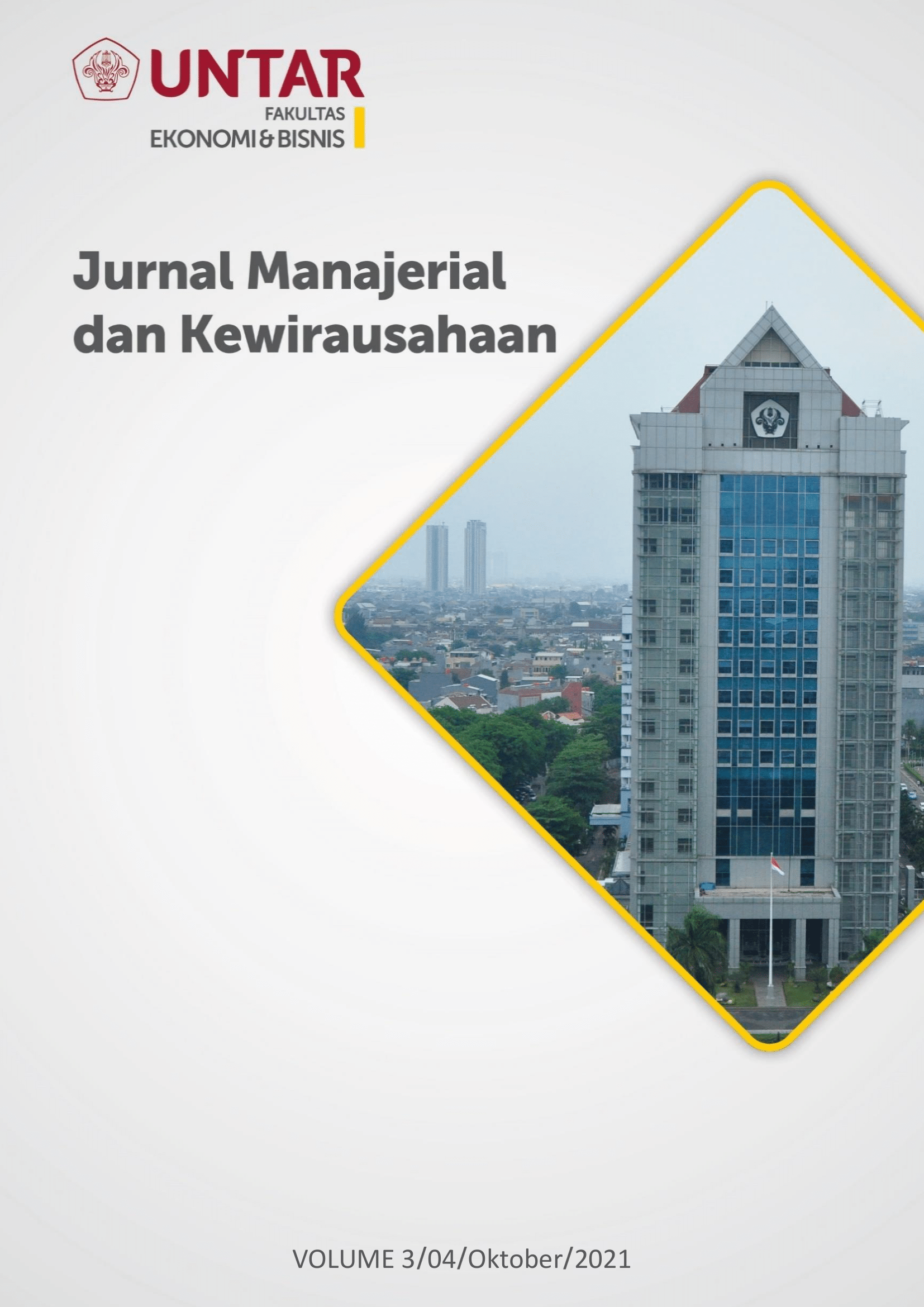Determinan Loyalitas Konsumen Situs Tokopedia Di Jakarta
Main Article Content
Abstract
The purpose of this study was to examine the effect of website quality on customer loyalty, directly and indirectly through trust and customer satisfaction. The population of this study was 140 Tokopedia website customers in Jakarta. The data collection technique used is convenience sampling by distributing online questionnaires. Data analysis used the Partial Least Square-Structural Equation Modeling (PLS-SEM) technique. The results of this study are website quality, trust, and customer satisfaction affect customer loyalty directly and indirectly.
Tujuan dari penelitian ini adalah untuk menguji pengaruh dari variabel kualitas situs terhadap variabel loyalitas konsumen melalui variabel kepercayaan dan kepuasan konsumen. Populasi dari penelitian ini adalah 140 pengguna situs Tokopedia di Jakarta yang dipilih dengan menggunakan convenience sampling. Data diambil dengan menggunakan kuesioner daring dan diolah menggunakan Partial Least Square-Structural Equation Modeling (PLS-SEM). Hasil penelitian ini adalah variabel loyalitas konsumen dipengaruhi secara positif oleh variabel kualitas situs, kepercayaan, dan kepuasan konsumen.
Article Details
Section
This work is licensed under a Jurnal Muara Ilmu Ekonomi dan Bisnis Creative Commons Attribution-ShareAlike 4.0 International License.,/p>
References
Ajzen, I. (1991). The Theory of Planned Behavior. Organizational Behavior and Human Decision Processes, 50: 179-211.
Akhgari, M., Bruning, E. R., Finlay, J., & Bruning, N. S. (2018). Image, performance, attitudes, trust, and loyalty in financial services. International Journal of Bank Marketing, 36(4), 744-763. https://doi.org/10.1108/ijbm-06-2017-0118
Al-Debei, M. M., Akroush, M. N., & Ashouri, M. I. (2015). Consumer attitudes towards online shopping. Internet Research, 25(5), 707-733. https://doi.org/10.1108/intr-05-2014-0146
Chang, C., & Hung, J. (2018). The effects of service recovery and relational selling behavior on trust, satisfaction, and loyalty. International Journal of Bank Marketing, 36(7), 1437-1454. https://doi.org/10.1108/ijbm-07-2017-0160
Filieri, R., Alguezaui, S., & McLeay, F. (2015). Why do travelers trust Tripadvisor? Antecedents of trust towards consumer-generated media and its influence on recommendation adoption and word of mouth. Tourism Management, 51, 174-185. https://doi.org/10.1016/j.tourman.2015.05.007
Giao, H. N., Vuong, B. N., & Quan, T. N. (2020). The influence of website quality on consumer’s E-loyalty through the mediating role of E-trust and E-satisfaction: An evidence from online shopping in Vietnam. Uncertain Supply Chain Management, 351-370. https://doi.org/10.5267/j.uscm.2019.11.004
Hair, J. F., Ringle, C. M., & Sarstedt, M. (2011). PLS-SEM: Indeed a silver bullet. The Journal of Marketing Theory and Practice, 19(2), 139-151.
https://doi.org/10.2753/MTP1069-6679190202
Hair, J. F., Risher, J. J., Sarstedt, M., & Ringle, C. M. (2019). When to use and how to report the results of PLS-SEM. European Business Review, 31(1), 2-24. https://doi.org/10.1108/EBR-11-2018-0203
Jeon, M. M., & Jeong, M. (2017). Customers’ perceived website service quality and its effects on E-loyalty. International Journal of Contemporary Hospitality Management, 29(1), 438-457. https://doi.org/10.1108/ijchm-02-2015-0054
Kataria, S., & Saini, V. (2019). The mediating impact of customer satisfaction in relation of brand equity and brand loyalty. South Asian Journal of Business Studies, 9(1), 62-87. https://doi.org/10.1108/sajbs-03-2019-0046
Keni, K., & Sandra, K. K. (2021). Prediksi customer experience Dan service quality terhadap customer loyalty: Customer satisfaction sebagai variabel mediasi. Jurnal Muara Ilmu Ekonomi dan Bisnis, 5(1), 191. https://doi.org/10.24912/jmieb.v5i1.11196
Kim, S., & Park, H. (2013). Effects of various characteristics of social commerce (Scommerce) on consumers’ trust and trust performance. International Journal of Information Management, 33(2), 318-
https://doi.org/10.1016/j.ijinfomgt.2012.11.006
Kincl, T., & Štrach, P. (2012). Measuring website quality: Asymmetric effect of user satisfaction. Behaviour & Information Technology, 31(7), 647-657. https://doi.org/10.1080/0144929x.2010.526150
Limbu, Y. B., Wolf, M., & Lunsford, D. L. (2011). Consumers' perceptions of online ethics and its effects on satisfaction and loyalty. Journal of Research in Interactive Marketing, 5(1), 71-89. https://doi.org/10.1108/17505931111121534
Madariaga, J. G., Recuero Virto, N., Blasco López, M. F., & Aldas Manzano, J. (2019). Optimizing website quality: The case of two superstar Museum websites. International Journal of Culture, Tourism and Hospitality Research, 13(1), 16-36. https://doi.org/10.1108/ijcthr-06-2018-0074
Malhotra, N. K. (2010). Marketing Research: An applied orientation (6th ed.).
Pearson Education. O'Cass, A., & Carlson, J. (2012). An E-retailing assessment of perceived website-service Innovativeness: Implications for website quality evaluations, trust, loyalty and word of mouth. Australasian Marketing Journal, 20(1), 28-36. https://doi.org/10.1016/j.ausmj.2011.10.012
Omoregie, O. K., Addae, J. A., Coffie, S., Ampong, G. O., & Ofori, K. S. (2019). Factors influencing consumer loyalty: Evidence from the Ghanaian retail banking industry. International Journal of Bank Marketing, 37(3), 798-820. https://doi.org/10.1108/ijbm-04-2018-0099
Özkan, P., Süer, S., Keser, ?. K., & Kocakoç, ?. D. (2019). The effect of service quality and customer satisfaction on customer loyalty. International Journal of Bank Marketing, 38(2), 384-405. https://doi.org/10.1108/ijbm-03-2019-0096
Putra, T. W., & Keni, K. (2020). Brand experience, perceived value, brand trust untuk memprediksi brand loyalty: Brand love sebagai variabel mediasi. Jurnal Muara Ilmu Ekonomi dan Bisnis, 4(1), 184. https://doi.org/10.24912/jmieb.v4i1.7759
Sekaran, U., & Bougie, R. (2013). Research methods for business: A skill-building approach (6th ed.). Wiley.
Selim, N. I., Zailani, S., Aziz, A. A., & Rahman, M. K. (2019). Halal logistic services, trust and satisfaction amongst Malaysian 3PL service providers. Journal of Islamic Marketing, ahead-of-print(ahead-of-print). https://doi.org/10.1108/jima-05-2018-0088
Slack, N. J., & Singh, G. (2020). The effect of service quality on customer satisfaction and loyalty and the mediating role of customer satisfaction. The TQM Journal, 32(3), 543-558. https://doi.org/10.1108/tqm-07-2019-0187
Worthington, S., Russell-Bennett, R., & Härtel, C. (2009). A tri dimensional approach for auditing brand loyalty. Journal of Brand Management, 17(4), 243-253. https://doi.org/10.1057/bm.2009.24

